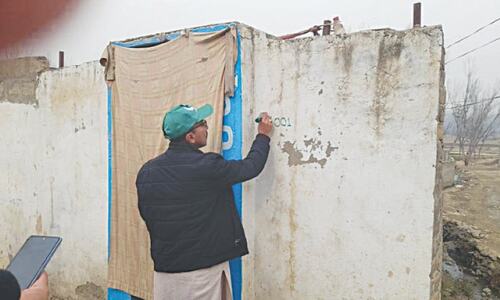KATHMANDU: A brief meeting between Prime Ministers Nawaz Sharif and Narendra Modi on Thursday salvaged the Saarc summit, with all eight countries clinching a last-minute deal to create a regional electricity grid.
“Yes, the electricity agreement has been signed,” Nepal’s Foreign Minister Mahendra Bahadur Pandey said, as the leaders emerged from a mountain retreat outside the Nepalese capital of Kathmandu.
Mr Sharif and Mr Modi caused a stir with their handshake at Dhulikhel, site of the retreat. The two leaders held each other’s hand for nearly 30 seconds. They also smiled and exchanged pleasantries.
Leaders clinch last-minute agreement to set up a regional electricity grid
Kathmandu’s City Hall broke into loud applause as Nawaz Sharif and Narendra Modi warmly shook hands, putting an end to the stiff statements by their foreign offices that ruled out a “structured” or “formal” meeting.
The prime minister’s Special Assistant Tariq Fatemi told journalists: “It was a spontaneous reaching out and shaking of hands. It was as if the entire region was waiting for this handshake.”
He said there was a great expectation from the South Asian Association for Regional Cooperation (Saarc) and that the event concluded on a “happy note”. “We go back very satisfied.”
Mr Fatemi said Saarc had taken a small step forward with the unanimous agreement on energy cooperation.
The grouping’s secretariat had initially proposed three agreements, but only one could be agreed upon as Pakistan had “certain reservations” on agreements on motor vehicles transportation and railways.
“We would suggest certain amendments so that they do not impinge upon the interest of Pakistan,” Tariq Fatemi said.
Until the handshake, the two leaders had cold-shouldered each other.
Squabbling between Pakistan and India is widely blamed for the poor performance of Saarc, which was founded in 1985 with the goal of moving towards a EU-style bloc.
Sushil Koirala, the prime minister of Nepal, said Saarc had fallen short of expectations, urging fellow leaders to “summon the political will” to translate their words into action.
“Despite having tremendous potential, our achievements stand short of expectations,” said Mr Koirala in a speech at the closing ceremony.
“We alone are responsible for our shortcomings .”
Despite a free trade pact in force since 2006, high tariffs and restrictions on movement keep trade among South Asian nations limited to just five per cent of their total trade.
Mr Modi announced that New Delhi would ease rules for business and medical visas. He also promised to lower India’s trade surplus.
BLOC’S FUTURE: When asked whether the Sharif-Modi handshake would make any difference to the bloc, Tariq Fatemi said Saarc members desired improvement in relations between Pakistan and India as it would go a long way to strengthening the regional grouping.
He recalled that world capitals had noted with concern the cancellation of foreign secretaries level talks by India in August.
Prime Minister Sharif had meetings with all other leaders except his Indian counterpart as Pakistan believes that the onus of a formal dialogue lies with India, Tariq Fatemi said, adding: “There was no formal meeting.”
Asked about the future after the handshake, the Special Assistant said Islamabad’s position remained the same _ Pakistan-India relations can move forward only through sustained dialogue.
“There is will and desire and the two could not move forward without pursuing it sincerely.”
In reply to a question, Tariq Fatemi said: “I am not in a position to comment on what happened at the retreat. Body language of both leaders was good. They were smiling and looked satisfied. “Our principled position has been maintained with dignity and honour. We did not succumb to pressure.”
Tariq Fatemi said Saarc members appreciated the vision of Prime Minister Sharif for regional connectivity and stronger cooperation.
The next Saarc summit will be held in Islamabad in 2016.
According to analysts, the bloc’s failure to integrate the region over the past three decades has left the way open for China to step in, with port and road developments.
China has observer status at the grouping. Vice Foreign Minister Liu Zhenmin on Wednesday promised $30 billion for road building in South Asia over five years, and suggested increasing trade to $150 billion over the same period.
Published in Dawn, November 28th, 2014














































